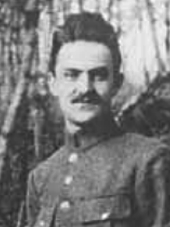Georges Antoine
April 28, 1892 – 15 November 1918
 Georges Antoine was a promising young Belgian composer and pianist, who lived just long enough to see the Armistice, but then
succumbed to an illness assumed to have been caused by the damp conditions he had encountered fighting in the Trenches in the first period of the conflict.
Georges Antoine was a promising young Belgian composer and pianist, who lived just long enough to see the Armistice, but then
succumbed to an illness assumed to have been caused by the damp conditions he had encountered fighting in the Trenches in the first period of the conflict.
Born in Liège on April 28, 1892, he had a musical upbringing; his father Eugene was choirmaster of Liège Cathedral and was in charge of the majority of local official music-making.
He died when Georges was fifteen and as the eldest child Georges became the head of his family. By this age, George's talent had already been recognised,
with the composer having commenced his studies at the Royal Conservatory of Liège aged 10.
His first opus, Sirens, of 1910 was for double chorus for mixed voices followed by Deux Melodies, a Violin Sonata in A flat, a lost piano concerto
plus a handful of songs "In an old style" in the following two years.
As a Belgian, he was involved in the conflict from the outbreak of hostilities in Summer 1914. At the time, it was widely assumed that
the conflict would be over after a few weeks and he wrote to a friend "nothing in the world would hold
me back: I’d need a gun, a kitbag and, above all, some bullets...it could not be said of me that someone who chooses to sing the
praises of his country would be capable of not defending it.” This bravado played down the fact that he suffered from chronic asthma.
He was soon involved in many of the early battles on Belgian territory including the seige of Malines
and the defence of Antwerp.
After the Battle of Yser in October 1914, the freezing winter that followed led to Georges catching a damp-related fever in the trenches, which in the early days of the war were
largely improvised with poor drainage. After this he was hospitalised and after multiple recurrences he was honourably discharged from the Army.
He settled in Saint-Malo, France giving lessons and concerts throughout 1915-1916 and completed his Sonata, and songs by poets such as Baudelaire, Corbiere, Klingsor, Samain and Verlaine,
gaining maturity in the period 1917-1918 with works for full orchestra.
In the summer of 1918 as the Allies pushed to win the war, George again rejoined the Belgian army, where as a librarian to the campaign army he witnessed the liberation of Bruges.
However, his return to the army was ill-advised and he suffered a recurrence of the fever. Doctors diagnosed a serious pulmonary disease.
A telegram to his mother noted that "On November 13...George became aware of his situation but as he had
already suffered so much during the war he did not believe in the seriousness of his illness.
In the evening, about seven o'clock, he died quietly, without agony, speaking of his next return to Liège, his mother and the Prix de Rome..."
The well-received premiere of his Trio took place a few days later in Amsterdam, with the performers unaware of its composer's fate.
Bibliography
This biography is largely derived from an article by Philippe Gilson
Librarian of Liège Royal Conservatory of Music, and the CD notes written by Christophe Pirenne (tr. Celia Skrine) for the only major release of his works; Georges Antoine, Quatuor et sonate (Oxalys, 2014).
Public domain compositions by Georges Antoine can be viewed at the IMSLP website